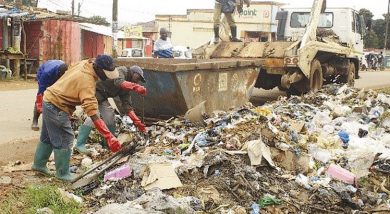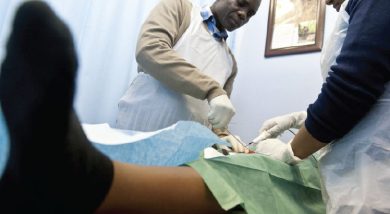To be a mother in Malawi is a curse
 Child birth in Malawi and many countries in Sub-Saharan Africa is a game of chance, with many women dying from the experience. The women die from preventable causes that arise from long distances to reach hospitals and health centres. The situation in developed countries speaks of a different story because maternal mortality has been drastically reduced. BRIGHT MHANGO looks at the situation from a rural health centre in Dowa.
Child birth in Malawi and many countries in Sub-Saharan Africa is a game of chance, with many women dying from the experience. The women die from preventable causes that arise from long distances to reach hospitals and health centres. The situation in developed countries speaks of a different story because maternal mortality has been drastically reduced. BRIGHT MHANGO looks at the situation from a rural health centre in Dowa.
Fatima Mphondera is just 21 and dropped out of school before she could get to Standard Eight.
She married at the age of 20, which was actually an achievement. Most of her friends got married at 15.
Fatima, who lives in Chidzuma Village in Dowa, has a nine-month pregnancy. She potters about the waiting area at Chankhungu Health Centre in the district, an hour’s drive from Lilongwe.
She constantly moves from her room to make sure the beans she is cooking have enough fire; her mother-in-law watching her cautiously all the time.
“My village is far from this hospital and with my advanced pregnancy, I decided to come and wait here as a precautionary measure. If I developed complications in the village, it could be a tall order without nurses to help me.
“This is my first pregnancy and I want to be sure I am safe. Again, the chief banned giving birth in the village, a directive that attracts a fine of one goat if disobeyed,” said Fatima.
But is Fatima really safe? What about the safety of her offspring?
Save The Children, an international non-governmental organisation, has just released the State of the World’s Mothers 2013 report which places Fatima in one of the worst countries to be a mother.
Out of 176 countries cited in the report, Malawi ranks 144th on the list of worst places to be a mother. If Fatima was a Finn, living in Finland she would be one of the luckiest mothers.
As for her baby, all manner of risks await its arrival because Save the Children says 3 million babies will die by December 31, with six out of 10 dying in the first month of being sired.
And Fatima’s chances of survival keep getting leaner as her poor background makes her even more vulnerable because the unpredictability of child birth mainly haunts mothers from the poor strata of society.
Fatima joins the rest of the Sub-Saharan women in being justifiably afraid. In the Save the Children report, 10 bottom-ranked countries are all in the region.
In this part of Africa, one in 30 women on average dies from a pregnancy-related problem, with one in every 7 babies dying before their fifth birthday.
Save the Children, however, says most babies that die succumb to preventable deaths such as prematurity, infections and complications at birth.
Back at Chankhungu Health Centre, which serves about 20 000 people from over 5 000 households in 72 villages, Fatima joins the 87 women who deliver babies there every month.
Jane Sibande, a midwife at the health centre, says they expect about 13 birth complications every month, mainly blood loss during and after birth. Sibande says the centre has devised means of fighting infant and maternal deaths.
“We have a motorcycle ambulance in case of an emergency, which we refer to the district hospital. We are very particular with pregnancies and we screen women for HIV, Malaria, anaemia and possible complications, which we treatment accordingly.
“This has proved effective and the last time we saw a woman die in childbirth was in January 2013, but it has become rare,” said Sibande.
Part of the success of the facility has come with the intensification of outreach programmes. In 2008, Save the Children trained 19 health surveillance assistants (HSA) at Chankhungu in community mobilisation and maternal and neonatal health.
Acting HSA supervisor at the health centre Christopher Luvela hails the intervention as a turning point in the fight against maternal mortality in the area.
“We now have 19 officers, 15 placed in hard-to-reach areas. We go in the villages where we offer counselling to every pregnancy we register and make follow-ups. We encourage the mother to report to hospitals early. This has worked and now an HSA can go a year without a home delivery,” said Luvela.
The community has also supplied the hospital with mats for pregnant women and guardians to sleep on.
Minister of health, Catherine Gotani Hara, when asked about the report, acknowledged the risks mothers and babies face in Malawi.
Hara said government is in an advanced gear to root out the deaths.
“The launch of the safe motherhood initiative shows commitment at the highest level.We don’t want to see a mother dying while giving birth and it is just one of the efforts we are implementing to fight maternal mortality,” said Hara.
Gotani said the high mortality rates can be attributed to the fact that most mothers are young. She said the solution lies in keeping the girl in school to keep her away from getting pregnant until she is mature.
The report asks countries to invest in empowering women, health workers, especially those at the front line, and in low cost technologies that can save lives at childbirth.
Senior Chief Kwataine, who heads the presidential initiative on safe motherhood, said more resources are needed in the area of safe motherhood to tackle the deaths.
The world is a sick and dying one. Malawi will bear witness to this with Fatima and her peers as evidence.





